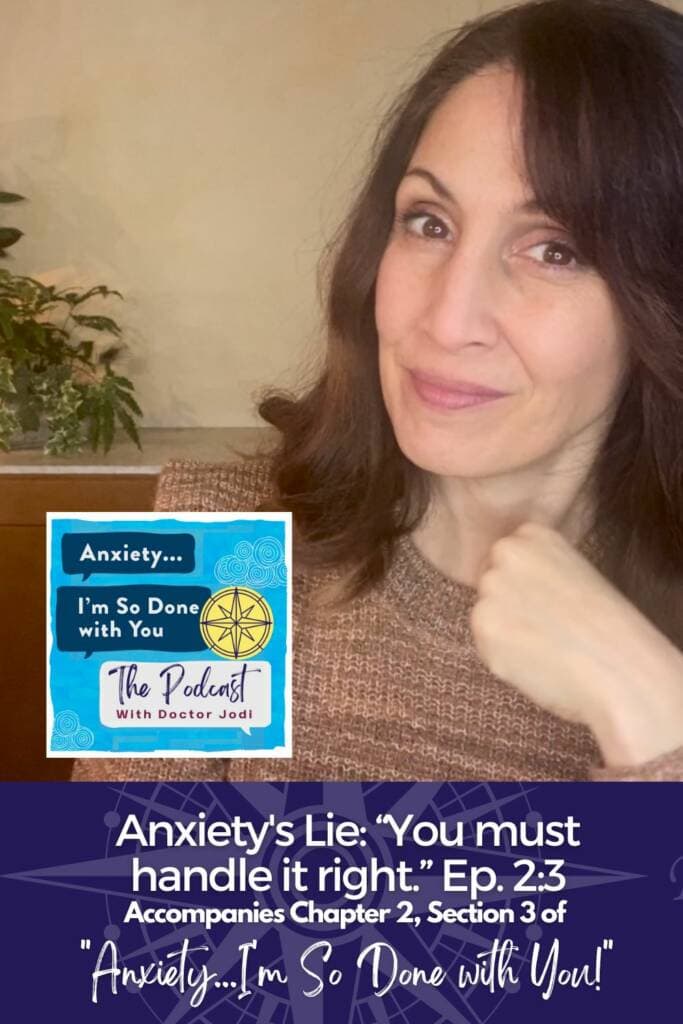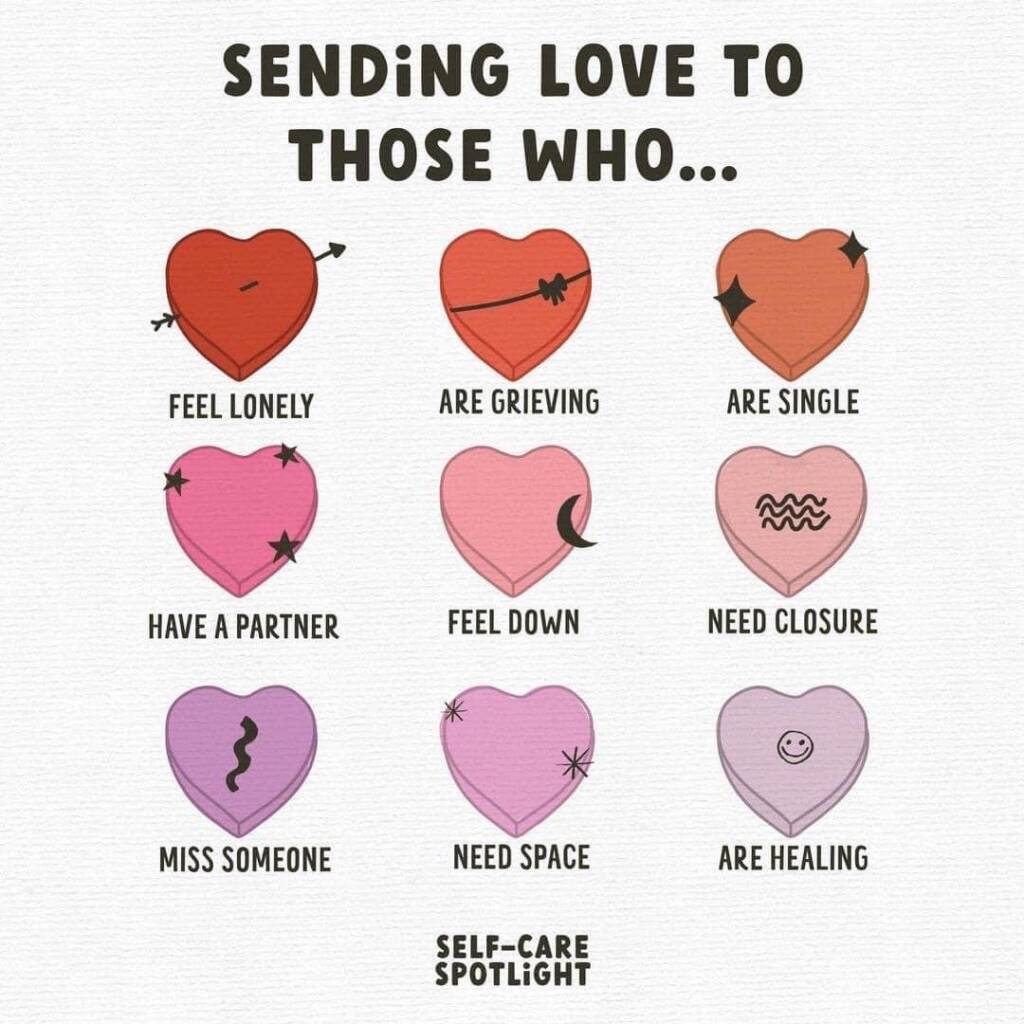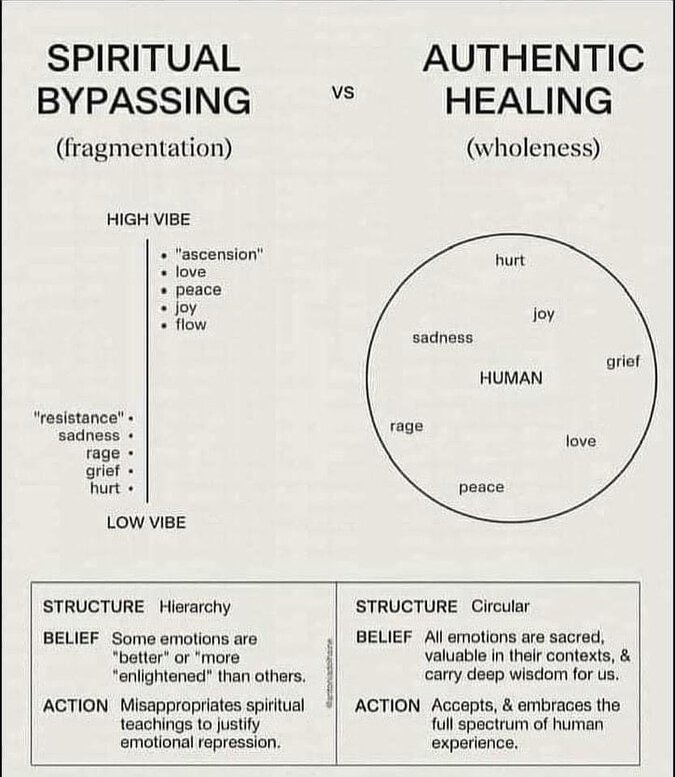This episode follows Chapter 2, Lie # 3: “You Must Handle It Right” of Anxiety… I’m So Done with You! How do you handle negative feelings? Or oppressive toxic positivity? In this episode, you’ll learn:
- Why fake positivity hurts you
- How dwelling too long on the bad things can lead to spiraling negativity
- What bypassing is
- How to bid your anxiety a not-fond farewell
You are human, you feel things, and it’s okay to feel upset about things that have happened to you. However, you don’t need to live with the hurt forever. But you also shouldn’t expect yourself not to be bothered by anything again. This episode will show you where the sweet spot is.
“You must handle it right!”

Always being positive and never being triggered are unrealistic expectations. It’s another example of colonizing Western Culture. That kind of thinking doesn’t allow you to be you. You deserve to feel but not stay feeling bad. Have you heard the saying, “if you are going through hell, keep going”? You want to allow a feeling so it can come up and out and not stay inside you.
In the exercise for this section of the book, I invited you to write a letter to your anxiety. In the letter, you take what you have learned about anxiety and tell it to leave you alone. To inspire you, I read an example of someone else’s goodbye letter. Soon, it’ll be you saying, “Take a seat, anxiety. I don’t want to listen to you anymore!”
- “When somebody hurts you, you get rejected, or if you are disappointed, feeling hurt, sad and worried, and betrayed is human. It’s weirder if you don’t feel those things. So when society gives us an expectation that we shouldn’t feel bad at all, it is not allowing us to be, well, us.” – Dr. Jodi Aman
Listen to Anxiety Lie #3:
Resources for this Episode:
Get my other book: You 1, Anxiety 0: Win Your Life Back from Fear and Panic
Managing Anxiety: Interview with Jude
Love Someone Up to You Instead of Worrying Down to Them ⬇︎


Transcription of Episode
Welcome to this episode where we’re talking about Chapter 2, Lie #3, “You must handle it right!” I’ll go over the easiest ways for you to handle negative feelings and talk about the power of saying goodbye to your anxiety.
What’s fake positivity? Also called toxic positivity, it’s thinking that being “positive” means you’re always happy, evolved, and above getting upset by whatever’s happening to you.
Some people call this bypassing, as in spiritual bypassing. Bypassing means dismissing the context of the problem, including if someone, or some structure, hurt you. That promotes the idea that you shouldn’t let anything bother you, no matter how horrible or unjust it is. Spiritual bypassing is when people on a spiritual journey embrace new-age ideas that convince them that there’s one truth, “Everything is a reflection of the mind.” The assumption is that people are hurt only when something unhealed inside them is triggered. Unfortunately, this has people double down on self-blame or, in the opposite vein, avoid responsibility for their actions and behavior that hurts others. They say, “If I hurt you, that was you being triggered about something inside of you.”
In some ways, I get it: if someone you did not care about rejected you, you’d feel it less than if it was someone you do care about. But if someone you didn’t care about stabbed you, you would totally care. I recognize that people sometimes repeat unhealthy patterns. However, if we blamed people’s inner triggers for injustices that happened to them, we would ignore injustice that doesn’t affect us because we would not see them as our problem.

Anxiety is constantly trying to engage you
Similarly, people think that not intending to hurt someone means they are not responsible for hurting them. It does feel a little better knowing they didn’t mean it, but they still hurt you. They’re responsible for the impact their words or deeds have made, and when that is acknowledged, it’s even more healing.
Did you ever have someone apologize to you saying, “I’m sorry if what I said hurt you, but that’s not what I meant” instead of:
“I’m sorry I said that. Thank you for the feedback. I’ll be more careful next time because I don’t want to hurt you.” There’s a big difference.
One is using intention as an excuse not to take responsibility for one’s words. People can hear that. It’s gaslighting: “I’m sorry you didn’t understand me correctly.”
The other apology is being accountable for saying something wrong and committing to improving now that they learned how it was received. Intention can be part of the apology. Knowing that they didn’t mean it does heal the relationship, but it’s better to come after acknowledging what was said or done. We still live in a world of form, and humans have feelings. You affect the people and the energy field around you, and you’re responsible for that.

Not always!
Okay, I’m listening to myself, and I’m thinking I have to make a caveat here because sometimes you’re dealing with someone who’s selfish and narcissistic, and you have to do the opposite of what I’m saying. They might be complaining about something you said, like when you were sticking up for yourself, and they might want you to take responsibility for it as if you’ve done something wrong. But I don’t want you to take responsibility for that.
If you’re wondering which situation you are in, or if you think that your perspective is clouded, take a step back. A distant perspective can help you understand the big picture and know what you’re dealing with. Also, you don’t have to do this alone! Especially if you are dealing with someone who is potentially manipulating you. Float the situation past a good friend and see what they think.


Taking care of the world
For me, understanding your impact is the second half of the spiritual journey. The first half is to free yourself of the shackles of the monkey mind and realize you are divine. Then, the second half uses that to take care of and change the world with that new understanding. Some people get stuck in the middle of that journey. It’s similar to what’s shared in anti-racist books; progressive white women feel the most dangerous to people of color. That is because they often take for granted that they are good and don’t continue to be reflexive and conscientious about their actions, thoughts, and behaviors. If you’re white and like to be an ally, you are never done doing the work on your implicit biases.
Bypassing is difficult for me to stomach as a social worker and as someone who’s worked with people who’ve experienced trauma for so long. Bypassing gives an excuse to blame and gaslight the victim. As if someone assaulting you is a reflection of your mind? As if you have total responsibility for what happened to you? No.
Victims taking responsibility for what happened to them is a problem we are trying to UNDO. When somebody hurts you, you get rejected, or if you are disappointed, feeling hurt, sad, worried, or betrayed is human. It’s weirder if you don’t feel those things. So society’s expectation that you shouldn’t feel bad no matter what happens is not allowing you to be human. (If you haven’t picked up on it yet, toxic positivity is another example of high expectations of Western culture. It’s a tactic of colonization.) You are human! Of course, you’re upset by the things that have happened to you!

Be gentler with yourself
So expecting yourself to: get over it fast, (1) be positive all the time, (2) act chill, (3) do everything right, etc., etc., are all unrealistic expectations. They are toxic because they make your very humanity feel inadequate.
The opposite of toxic positivity is spiraling negativity.
Did you ever start ranting about something, and it feels really good to get it out, but then it seems to cross a line where everything negative from your whole life, your whole past, comes into your consciousness and joins with what is happening now? It is good to get feelings out. That is helpful. It’s better outside of you than inside of you! Ranting can feel cathartic and relieving. But there is a point when things start to feed upon themselves, bringing up more and more bad memories and making you feel worse.
Globs of negative self-judgment and worry circles come exponentially, upsetting you more. What’s worse, this can affect behavior. You may do something to push someone you need away from you or hurt someone that you don’t mean to hurt.
So how do we find the sweet spot between toxic positivity and spiraling negativity? You balance. You’ve honed this one if you did the exercise in the last section. (If you didn’t do that exercise, what happened? That was one of the most important things in this book! 😉). If you did do it, you know what I’m going to say.
You have to let yourself feel.
Once you face the problems and have compassion for yourself, you don’t attach to your feelings. From there, you can learn, resolve, or evolve from them. Otherwise, you keep spiraling.
Keep in mind, though, if you don’t attach, and the feeling dissolves, your mind will still try to bring it up again. (That’s what we covered in the exercise.) Expect this. This is human, and now you have the script to address it:
“Oh, hey self-blame, I knew you’d come back…”
“Oh, hey hurt, I knew you’d come back…”
“Oh, hey pain, I knew you’d come back…”
“Oh, hey––whatever it is that you feel––I knew you’d come back. Have a seat. I’m busy right now.”
Then you take your mind off it and onto something else. Do some kind of engaging physical or mental activity.
When people fully feel their feelings and so don’t attach to them, they get to this time when they can take their attention away quite quickly.
Don’t worry if you don’t fully have this embodied yet. (I’ll give many more examples of this as this series continues because I’m not leaving here until you get this one!)

What is happening?
Next, I want to take a moment to chat about who you surround yourself with. If you are in a group of friends who spiral into negativity, I’m worried about you all. I understand there’s a profound sense of belonging when you feel bad and join a group like this. Misery loves company. However, this kind of group sometimes creates a mini-culture that implicitly values suffering. This makes group members less motivated to improve because that would mean they no longer belong. Implicit means it’s there and affecting the situation, but it’s invisible and not said aloud. The opposite is explicit. Explicitly these groups hate suffering, of course, they do. People can think one way and have implicit biases operating counter to that, powerfully affecting them. Anytime you make what’s implicit explicit, you take that power back.
You need that sense of belonging, but I want you all to lift each other up and not stay down together. You’re sensitive, caring, and worried about each other. This can make you feel worse. I have a way to stop that. Watch my video, Loving People Up to You Instead of Worrying Down to Them.

What’s in Your Hand?
In the What’s in Your Hand? exercise of this section, I invite you to write a letter to your anxiety. This exercise is a powerful way of exposing what you have learned about your anxiety and stating your commitment to living life on your terms. In the book, I give you an example letter. Here I’m going to read you a different example.
This is a letter from Cindy to the voice of self-hate.
For many months you have pushed the limits to try and conquer me. You pretended to be my only true friend and made me believe that I was fat, ugly, and unattractive to anyone. You began to mold me into someone I could no longer recognize with tasteless thoughts and immoral concepts.
You took what was mine from me and didn’t even bother to replace it. You tried to take from me my only true passion, field hockey, and make me believe I would never succeed. There were no boundaries. I even turn on my own family. I argued with the ones I love for being too close to me. You encouraged me to push them all away regardless of the consequences.
I will and am overcoming you.
I’m regaining my life back because no matter what things you’ve tried to do to me or how much you’ve tried to rule my life; I’m not going to stand for it anymore. You told me to ignore my best qualities and ignore what others said around me because they can never be true. I finally know my worth, and I’m saying goodbye to you and all my other problems who don’t believe in me and aren’t helping me get to where I’m going.
I have a wonderful family that loves me and amazing people around me that support me. And I’m lucky enough to be grateful for every day and every luxury I have. I’m destroying the beliefs you have tried so hard to instill in me––that I was ugly, worthless, unintelligent, fat, unathletic (sic), and the black sheep of my family.
Of course, I care about everyone around me. I’m very smart and wise beyond my years. I believe I’m a great friend and a role model for those who look up to me. I’m a scholar-athlete, musically talented, and have been gifted with a great school system and a safe town in semi-good weather. Luckily, I’m attractive to those who I want to attract. If someone would only like me as a size zero, they are not worth my time anyway! And I know now, and fully believe, that my personality on the inside radiates to the outside and affects those around me. I’m not fat; I’m working conscientiously to become healthier, not heavier. I’ve always been in a healthy weight anyway, especially as a three-sport athlete. So how dare you tell me what beautiful is and try to define who I am, based on stereotypical shallow, materialistic values?
I don’t want to listen anymore!
~Cindy
Take a moment to let that sink in.
Hopefully, Cindy’s letter encourages you to write your own letter. I promise it is a powerful exercise. Then if you’re willing, come over to my blog and share it, or part of it, in the comments, then your letter will inspire future visitors to say goodbye to their problems, too.
Thank you so much for listening to this podcast “Anxiety… I’m So Done with You!” with me Dr, Jodi. (Ha! “Anxiety… I’m so done with you”––that could be the start of your goodbye letter!)
This episode taught us about toxic positivity, spiraling negativity, and the power of saying adios to your anxiety through a goodbye letter.
I love you for subscribing and leaving me five-star reviews on Apple Podcasts. The next episode is Chapter 2, Lie #4, “You must be in control!” (at all times in all ways in all places). Oh my gosh, this is going to be powerful! Read or listen to that, and I’ll meet you there.
